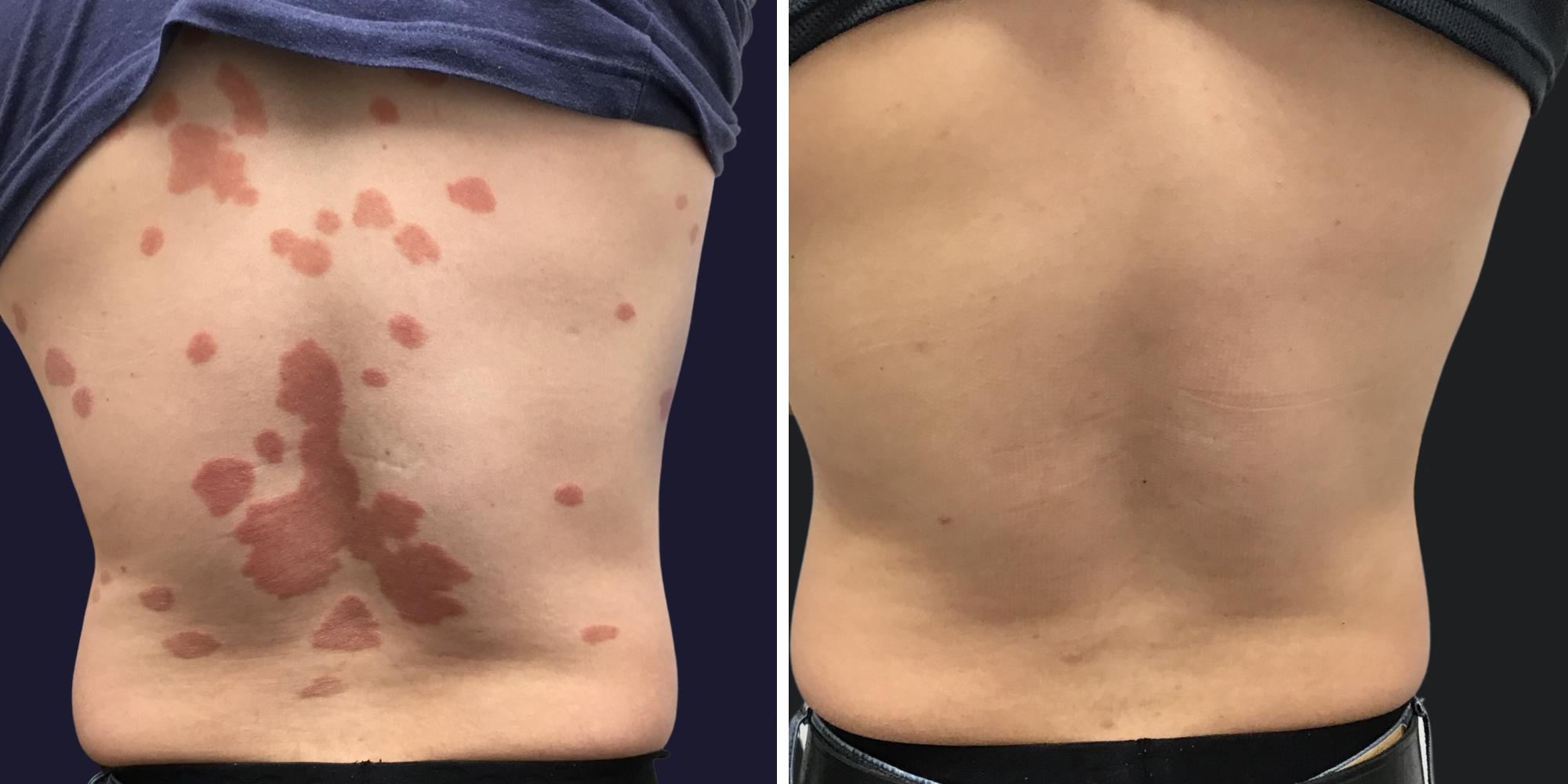Enjoy Clear, Healthy
Skin Again
Get long-lasting relief and treat your psoriasis at the source with advanced, comprehensive treatments from Chicago Skin Clinic.
Our board-certified dermatologists, Dr. Danny Del Campo and Dr. Danilo Del Campo, have the compassion and industry expertise necessary to work closely with you to develop a customized treatment plan that suits your individual needs.
What Is Psoriasis?
Psoriasis is a chronic, non-contagious skin condition that causes your skin cells to multiply at an accelerated rate.
Normally, skin cells go through a cycle of growth and shedding over the course of a month. However, psoriasis significantly speeds up this process. This rapid buildup of skin cells can cause thick, red patches and uncomfortable scales to form on the surface of your skin.
The Impact of Psoriasis
Psoriasis is not only skin deep. If you suffer from psoriasis, you know that this condition not only affects your physical appearance — it can also take a toll on your emotional well-being and overall quality of life.
The visible symptoms of psoriasis — such as redness, scaling, and itching — can cause self-consciousness, embarrassment, and discomfort. Additionally, the chronic nature of psoriasis and its unpredictable flare-ups can lead to increased stress, anxiety, and social isolation.
Understanding the causes and impact of psoriasis is crucial in developing effective treatment strategies. At Chicago Skin Clinic, we specialize in comprehensive psoriasis management, addressing both the visible symptoms and the underlying immune system dysfunction. Our goal is to help you achieve clearer, healthier skin and regain your confidence and quality of life.
Causes of Psoriasis
While the exact cause of psoriasis remains unknown, it’s believed to be a result of a combination of genetic and environmental factors. Some of the common triggers and contributing factors include:
- Immune system dysfunction: Psoriasis is an inflammatory condition, which means the immune system mistakenly triggers inflammation and excessive cell production.
- Genetics: Psoriasis tends to run in families, suggesting a genetic predisposition to the condition. Certain genes are believed to play a role in the development of psoriasis.
- Environmental factors: Various environmental factors, such as infections, injuries to the skin, stress, and certain medications, can trigger or worsen psoriasis symptoms.
- Lifestyle factors: Unhealthy lifestyle habits — such as smoking, excessive alcohol consumption, and obesity — can increase the risk of developing psoriasis as well as exacerbate existing symptoms.
Discover Effective Psoriasis Treatment for You
At Chicago Skin Clinic, we offer comprehensive treatment options tailored to your unique needs, aiming to effectively manage and control your psoriasis symptoms.
Our experienced team of board-certified dermatologists will work closely with you to develop a personalized treatment plan that focuses on reducing inflammation, promoting skin healing, and improving your overall quality of life.
Topical Treatments
Topical treatments are often the first line of defense in managing mild to moderate psoriasis. Dr. Danny Del Campo or Dr. Danilo Del Campo will prescribe various creams, ointments, lotions, or foams containing active ingredients such as corticosteroids, vitamin D analogs, salicylic acid, or retinoids. These medications help to reduce inflammation, alleviate itching, and promote skin cell turnover.
Phototherapy
Light therapy, also known as phototherapy(nbUVB or narrowband phototherapy), involves exposing your skin to specific wavelengths of light to reduce inflammation and slow down the rapid cell growth associated with psoriasis.
At Chicago Skin Clinic, we offer different types of light therapy, including narrowband ultraviolet B (nbUVB). Our experienced dermatologists will determine the most suitable light therapy approach for your individual needs.This treatment is time-tested and has been a standby of treatment for decades. We offer this in our Chicago office.
Oral Treatments
For more severe or widespread psoriasis, oral medications or systemic treatments may be recommended. These medications work from within the body to target the underlying immune system dysfunction responsible for psoriasis.
Our dermatologists will carefully evaluate your condition, medical history, and lifestyle factors to determine the most appropriate oral or tablet treatment option for you.
Injections
In some cases, when topical or oral treatments are not effective, injectable biologic medications may be considered. Biologics are genetically engineered proteins that target specific molecules involved in the immune response. They help to suppress the overactive immune system and reduce inflammation associated with psoriasis.
Dr. Danny Del Campo and Dr. Danilo Del Campo are experienced in administering these injections and will closely monitor your progress throughout the treatment.
Lifestyle Changes
As you discuss your psoriasis and how it affects your life, Dr. Danny Del Campo and Dr. Danilo Del Campo may also suggest you make the following changes to your diet, exercise, and overall lifestyle:
- Manage your risk factors for heart disease and stroke with your primary care physician.
- Adopt a healthy lifestyle: eating a balanced diet, trying to lose weight if you are overweight, and exercising regularly.
- Quit smoking.
- Lower your alcohol intake.
- Reduce stress, where possible.
- Discuss joint symptoms with your dermatologist.

Experience Personalized Care for Your Psoriasis
During your consultation at Chicago Skin Clinic, Dr. Danny Del Campo and Dr. Danilo Del Campo will thoroughly evaluate your psoriasis symptoms and medical history to develop a customized treatment plan.
Our goal is to help you achieve long-term control over your psoriasis, reduce flare-ups, and improve the appearance and comfort of your skin. With our advanced treatments and expert care, you can regain confidence and enjoy a better quality of life.
 SCHEDULE NOW
SCHEDULE NOW